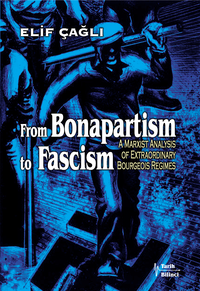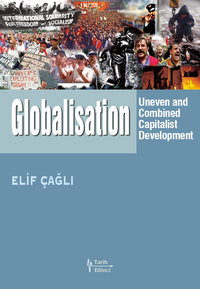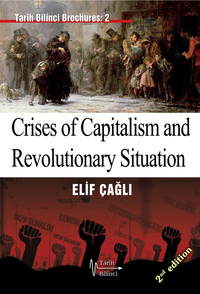For humankind to emancipate from the exploitation and oppression created by class society, be his own master, save nature from the destructive effects of capitalism and put it in harmony with his long term interests; in short, reach his freedom can only be possible through world socialist revolution. To open this road to universal freedom, that is the historical mission of the modern proletariat. For the proletariat is the only real class that is capable of putting an end to the international capitalism dragging mankind towards a destruction.
The proletariat seizes the public power and by means of this transforms the socialised means of production, slipping from the hands of the bourgeoisie, into public property. By this act, the proletariat frees the means of production from the character of capital they have thus far borne, and gives their socialised character complete freedom to work itself out. Socialised production upon a predetermined plan becomes henceforth possible. The development of production makes the existence of different classes of society thenceforth an anachronism. In proportion as anarchy in social production vanishes, the political authority of the state dies out. Man, at last the master of his own form of social organisation, becomes at the same time the lord over nature, his own master – free.
To accomplish this act of emancipation is the historical mission of the modern proletariat. To thoroughly comprehend the historical conditions and thus the very nature of this act, to important to the now oppressed proletarian class a full knowledge of the conditions and of the meaning of the momentous act it is called upon to accomplish, this is the task of the theoretical expression of the proletarian movement, scientific socialism.[1]
Capitalism has created the objective conditions of organisation of socialism on a world scale from the day it constituted a world system. The fact that capitalist system of exploitation still exists on a world scale despite the ripeness of the objective conditions for socialism manifests its results most strikingly in the profound degeneration and decay marring the whole social life, in the destruction of human race and nature.
Capitalism is an international system, which has created a system of market and production relations on a world scale. That is why to put an end to the domination of capitalism can only be accomplished on an international scale and the proletarian revolution must be a world revolution. The emancipation of the working class is neither a local nor a national question. To achieve this goal, joint action of the world proletariat is needed particularly on the basis of practical and theoretical collaboration of the proletariat of the most developed countries embracing whole countries that contain modern society. Since the proletarian revolution is a world revolution its revolutionary power must also assume the same scope. Hence the goal of the working class cannot be establishing “isolated”, separate workers’ powers. Such a situation is never in accordance with the historical interests of the working class.
A workers’ power confined to national boundaries and a backward economic base cannot survive should this isolation persist. A proletariat that comes to the power in a country should direct all its efforts towards spreading the socialist revolution to other countries. And because the power of the working class is embodied in the power of soviets, the establishment of an international workers’ power will find its expression in a “World Republic of Soviets”. This situation represents the end of the capitalist rule on a world scale.
The progress of proletarian revolution towards this goal cannot take place in such a way that individual countries break off the imperialist chain one by one, with intervening long historical periods. Marx and Engels anticipated the process of world revolution as a series of proletarian revolutions which closely follow each other and are closely connected with each other. And historical experience confirmed the anticipation of the founders of Marxism, by demonstrating the impossibility of an enduring victory unless such a progression takes place.
In order proletarian world revolution to proceed and worker’s power to survive, successively won victories of proletarian revolution, essentially in the advanced countries, are needed. Although it is possible to build the dictatorship of the proletariat in a single country, its basic task must be to prepare for a new and lasting leap forward of the international revolutionary forces of proletariat. The founders of Marxism did not deny that political introduction of the socialist revolution, i.e. the conquest of the political power by the proletariat, is quite possible in a single country. But they never anticipated that this revolution could remain in isolation for a long time.
The historical task of the workers’ power is to put an end to the economic privileges of the bourgeoisie which has lost its political power, abolish capitalism by carrying out the social transformations, abolish the exploitation of human beings by human beings, reach the classless society. Although it is the duty of the proletariat that has come to the power in a country to start these transformations, it would be a reactionary utopia to limit the revolutionary targets to a national scale (such as socialism in one country) for the liquidation of capitalism is a task that can be accomplished only on an international scale. The historical interest of proletarian power and the guarantee for its victory lies in advancing the world revolution, i.e. in the permanence of revolution. The tendency to stop, freeze and confine an already started social revolution to national boundaries is a characteristic feature of the petty-bourgeois revolutionism.
While the democratic petty bourgeois wish to bring the revolution to a conclusion as quickly as possible, and with the achievement, at most, of the above demands, it is our interest and our task to make the revolution permanent, until all more or less possessing classes have been forced out of their position of dominance, until the proletariat has conquered state power, and the association of proletarians, not only in one country but in all the dominant countries of the world, has advanced so far that competition among the proletarians of these countries has ceased and that at least the decisive productive forces are concentrated in the hands of the proletarians. For us the issue cannot be the alteration of private property but only its annihilation, not the smoothing over of class antagonisms but the abolition of classes, not the improvement of existing society but the foundation of a new one.[2]
The revolutionary Marxist leaders of the proletariat remain loyal to this appeal of Marx and Engels to communists. Their conviction to the idea of the permanency of revolution was expressed in the first article of the statute of the Third International accepted in the 1920 Congress:
The new International Working Men’s Association is founded to organise joint action by the proletarians of different countries, who are pursuing a single aim: the overthrow of capitalism and the establishment of dictatorship and of an international Soviet republic which will completely abolish classes and establish socialism, the first stage of communist society.[3]
Trotsky was the first to raise the flag of struggle against Stalinism which step by step moved the Comintern away from proletarian internationalism and erected the conception of national socialism in front of the world revolution as an obstacle. And he persistently continued his revolutionary struggle until the end of his life. The truth of the matter is that today’s generations of internationalist revolutionary struggle can clarify their understanding of permanent proletarian revolution thanks to Trotsky:
The socialist revolution begins on national foundations–but it cannot be completed within these foundations. The maintenance of the proletarian revolution within a national framework can only be a provisional state of affairs, even though, as the experience of the Soviet Union shows, one of long duration. In an isolated proletarian dictatorship, the internal and external contradictions grow inevitably along with the success achieved. If it remains isolated, the proletarian state must finally fall victim to these contradictions. The way out for it lies only in the victory of the proletariat of the advanced countries. Viewed from this standpoint, a national revolution is not a self-contained whole; it is only a link in the international chain. The international revolution constitutes a permanent process, despite temporary declines and ebbs.[4]
The socialist revolution begins on the national arena, it unfolds on the international arena, and is completed on the world arena. Thus, the socialist revolution becomes a permanent revolution in a newer and broader sense of the word; it attains completion only in the final victory of the new society on our entire planet.[5]
As every class that comes to power proletariat has to put forward its own interests as the general interests of society as well. But under workers’ power this fact will assume a qualitatively different character from two respects. First, while the interests of the bourgeoisie mean the continuation of the capitalist system of exploitation, which threatens the future of mankind, the interests of the working class mean the liquidation of capitalism and transition to classless society. And second, when the bourgeoisie imposes its self-interests on society as “common interests” by means of bourgeois state, there is literally a forceful imposition. Thus the bourgeois society is a deceiving pseudo partnership from the point of view of exploited majority. Even under the form of bourgeois democracy the bourgeois dictatorship is the means of oppressing the working class and the toilers. Yet under the dictatorship of the proletariat unlike the bourgeois society there will be no antagonisms between the self-interest of the working class and the interests of the other toiling sections of society. From an historical point of view a workers’ power has to represent these layers as well.
Pointing out in this context that all revolutions during the course of history up to the proletarian revolution are “minority revolutions” Engels says the following:
All revolutions up to the present day have resulted in the displacement of one class role by another; but all ruling classes up to now have been only small minority in relation to the ruled mass of the people. One ruling minority was thus overthrown; another minority seized the helm of state in its stead and refashioned the state institutions to suit its own interests. This was on every occasion the minority group qualified and called to rule by the given degree of economic development; and just for that reason, and only for that reason, it happened that the ruled majority either participated in the revolution for the benefit of the former or else calmly acquiesced in it. But if we disregard the concrete content in each case, the common form of all these revolutions was that they were minority revolutions. Even when the majority took part, it did so – whether wittingly or not– only in the service of a minority; but because of this, or even simply because of the passive, unresisting attitude of the majority acquired the appearance of being the representative of the whole people.[6]
And also pointing out the qualitative change with the emergence of the great potential of transforming society on stage of history, which can be realised under the leadership of the working class, he goes on to say:
The time of surprise attacks, of revolutions carried through by small conscious minorities at the head of unconscious masses, is past. Where it is a question of a complete transformation of the social organisation, the masses themselves must also be in it, must themselves already have grasped what is at stake, what they are going in for, body and soul. The history of the last fifty years has taught us that. But in order that the masses may understand what is to be done, long, persistent work is required, and it is just this work that we are now pursuing, and with a success which drives the enemy to despair.[7]
Therefore both in advanced capitalist countries, in which the majority of population is proletarianised, and in the underdeveloped or moderately developed capitalist countries, in which the proletariat together with urban and rural poor constitutes the majority of the population the political target of the revolutionary proletariat is to establish a real workers’ democracy. It is a proven fact that in imperialist epoch, except a proletarian power, it is impossible for this or that “democratic power” in these countries to solve democratic tasks.
Therefore, the progress of social revolution in all capitalist countries today can only be possible, should the oppressed majority of population be united under the hegemony of proletariat which is effectively organised to build a worker’s power. Any conceptions of staged power, that the so-called need for a separate stage of “democratic revolutionary” power (the “democratic” dictatorship of proletariat and peasantry or petty-bourgeoisie in general) as a beginning in order to fulfil the democratic tasks of the revolution, cannot be the revolutionary strategy of the working class. Such strategies of staged revolution, theoretically blur the proletariat’s aim of power, and practically have no chance to advance the revolution. Petty bourgeois revolutionary governments or the “revolutionary” coalitions that are not established under the hegemony of the proletariat ends up, in the final analysis, with class collaboration with the bourgeoisie. As proved by historical experiences, in the imperialist epoch, it is the proletarian revolution that can accomplish both democratic transformations and socialist transformations which would abolish capitalism. The revolutionary proletariat’s target is to build its own democracy, i.e. the dictatorship of the proletariat.
[1] Marx and Engels, Selected Works, Vol. III, p.151
[2] Marx and Engels, Selected Works, Vol. I, pp.178-9
[3] “Statutes of the Communist International”, Theses, Resolutions and Manifestos of the First Four Congresses of the Third International, Pluto, London, 1983, pp. 124-5
[4] Trotsky, Permanent Revolution and Results and Prospects, Pathfinder Press, p.133
[5] Trotsky, Permanent Revolution and Results and Prospects, p.279
[6] Marx and Engels, Selected Works, Vol. I, p.190
[7] Marx and Engels, Selected Works, Vol. I, pp.199-200
link: Elif Çağlı, I. The Historical Mission of The Proletariat, May 1991, https://enternasyonalizm.org/node/565






